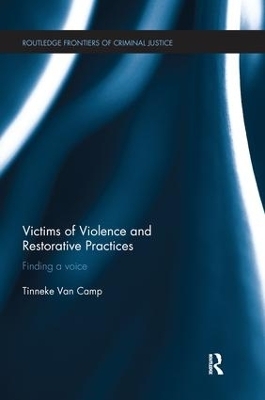
Victims of Violence and Restorative Practices
Routledge (Verlag)
978-1-138-66608-5 (ISBN)
Restorative justice occupies an important place in criminological literature and criminal justice policies and is about facilitating communication between victims, offenders and communities in search of conciliation. Research shows that victims of crime are generally highly satisfied with their participation in a restorative intervention, such as victim-offender mediation, family group conferencing and victim-offender encounters. In order to maintain good restorative practice, the reasons why restorative justice is appreciated need to be clearly understood. In this book, Tinneke Van Camp identifies and explores the factors that contribute to victims’ appreciation of restorative practices in order to advance insight into why restorative justice works for victims.
Based on original research and qualitative interviews with victims of violent crime, this book draws on procedural justice theory and socio-psychological studies and analyses how victims value restorative interventions. The findings shed a light on the factors that contribute to victim satisfaction with restorative interventions and show how they relate to procedural fairness, as well as allow an exploration of how the timing of the restorative intervention in the criminal justice proceedings affects victim appreciation.
With its use of in-depth interviews and case descriptions, this book will be of interest to academics, practitioners and students alike. It will be of particular interest to those engaged in the study of victims and victim concerns, restorative justice and procedural justice.
Tinneke Van Camp has worked as a research assistant at the Catholic University of Leuven and the National Institute for Criminalistics and Criminology (Belgium). In 2011, she obtained a PhD in criminology from the University of Montreal (Canada). In 2013, Tinneke joined the School of Law at the University of Sheffield. Her main interests lie in victim experiences with restorative justice and judicial proceedings.
Introduction 1. Two approaches to promote justice for victims of crime and where they meet 2. Restorative justice implemented – the Canadian and Belgian case 3. The restorative procedure valued irrespective of its outcome 4. Finding a voice and entering into a dialogue 5. Meeting diverse motives 6. The role of the restorative approach before and after judicial adjudication Conclusion.
| Erscheinungsdatum | 15.02.2017 |
|---|---|
| Reihe/Serie | Routledge Frontiers of Criminal Justice |
| Zusatzinfo | 4 Tables, black and white |
| Verlagsort | London |
| Sprache | englisch |
| Maße | 156 x 234 mm |
| Gewicht | 294 g |
| Themenwelt | Recht / Steuern ► Allgemeines / Lexika |
| Recht / Steuern ► EU / Internationales Recht | |
| Recht / Steuern ► Strafrecht ► Kriminologie | |
| Recht / Steuern ► Strafrecht ► Strafverfahrensrecht | |
| Sozialwissenschaften ► Soziologie | |
| ISBN-10 | 1-138-66608-4 / 1138666084 |
| ISBN-13 | 978-1-138-66608-5 / 9781138666085 |
| Zustand | Neuware |
| Haben Sie eine Frage zum Produkt? |
aus dem Bereich


